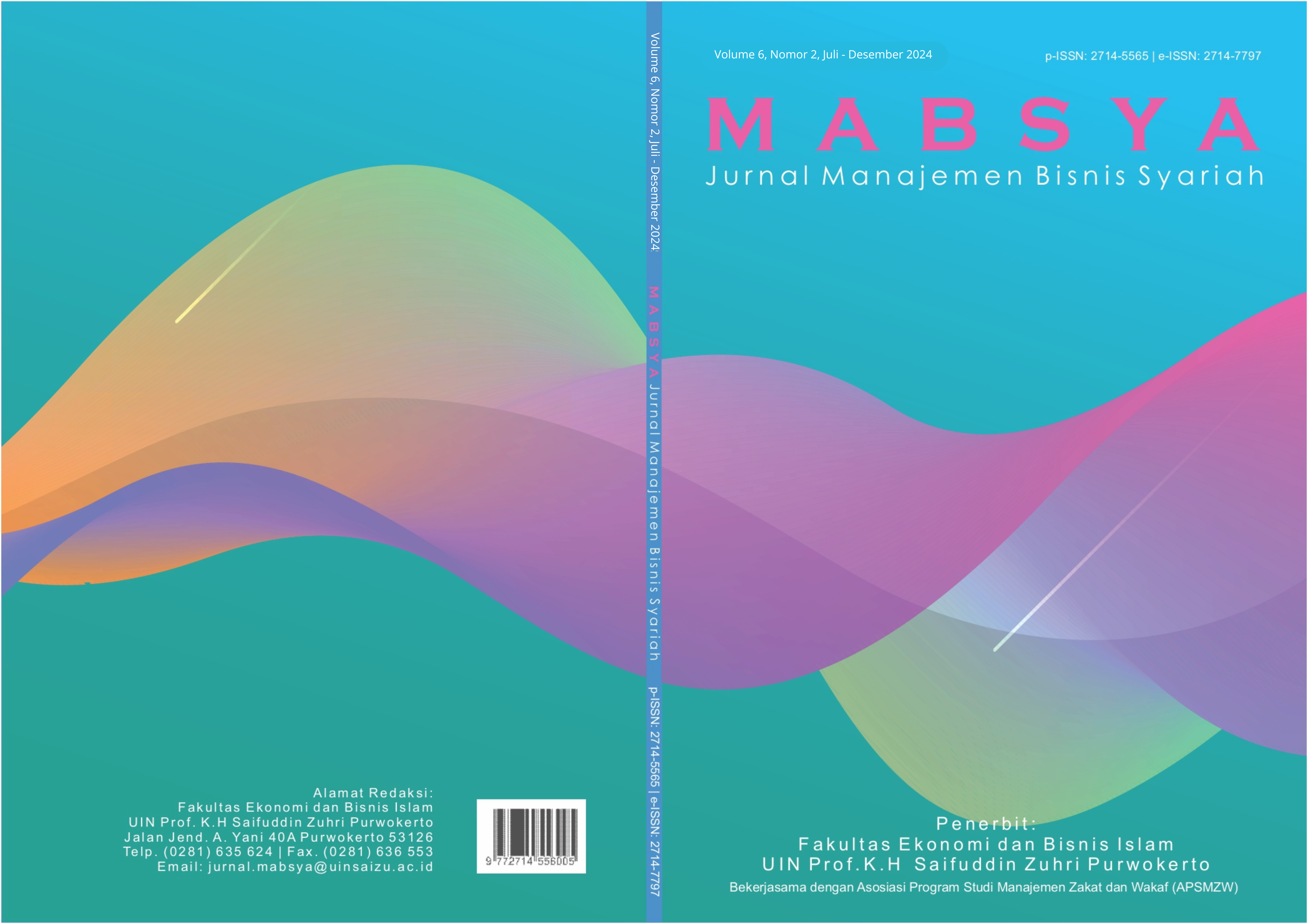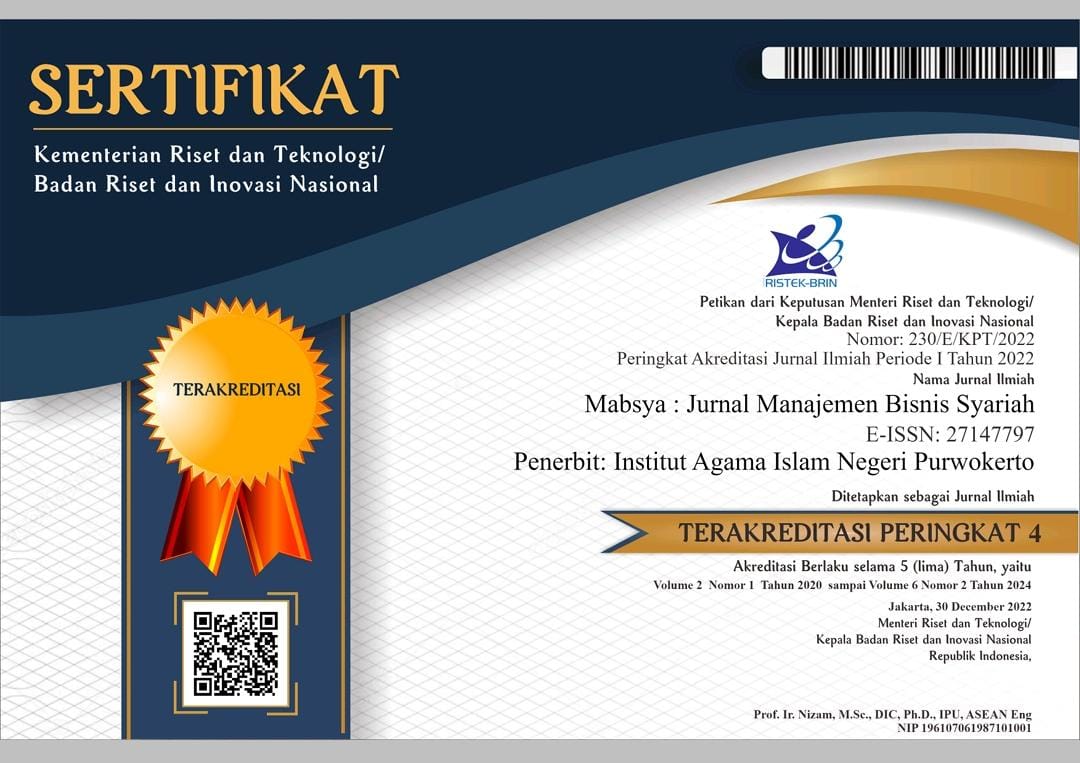The Impact of ZIS Fund Management by Lazismu on the Growth and Empowerment of UMKM
DOI:
https://doi.org/10.24090/mabsya.v6i2.12328Keywords:
Zakat; Infaq; Sadaqah; Fund Management; MSMEs; LazismuAbstract
The management of Zakat, Infaq, and Sadaqah (ZIS) funds plays a critical role in supporting the growth of Micro, Small, and Medium Enterprises (MSMEs) in West Kalimantan, as these funds provide essential capital to businesses with limited access to formal financing. This study explores how Lazismu Kalimantan Barat manages ZIS funds and examines their impact on the development of local MSMEs. Using a qualitative methodology, data were collected through in-depth interviews with ZIS fund recipients. The research focuses on the processes of fund distribution, utilization, and the challenges faced by MSMEs in managing the capital received. The findings reveal that Lazismu has implemented an efficient and transparent process for distributing ZIS funds, facilitating access for recipients. The funds are primarily used to enhance production capacity, improve product quality, and support business operations. Additionally, MSMEs benefit from financial management and marketing training provided by Lazismu. However, challenges in fund allocation remain, indicating the need for more intensive mentorship in financial planning. The study concludes that Lazismu's effective management of ZIS funds has significantly contributed to MSME growth, particularly in production capacity, innovation, and market expansion. Future programs should prioritize in-depth financial training to maximize the impact of ZIS funds and further support MSME sustainabilityReferences
Ali Keya Anami. (2024). Zakah as a social responsibility for small and medium enterprises (SMEs). International Journal of Scholarly Research and Reviews, 4(1), 009–016.
Andira Tsaniya Al-Labiyah, Lusi Nurul Aulia, Najuwa Aurel Annisa, & Lili Puspita Sari. (2023). Peran ZIS Terhadap Peningkatan Kesejahteraan Sosial di Indonesia. Islamic Economics and Business Review, 2(2).
Azham, N. I. A. (2024). Islamic Finance for Social Good: Exploring the Synergy Between Sukuk and Waqf. SSRN Electronic Journal.
El Hammoumi, A., Seghyar, N., Gouiouez, M., Amane, M., & Berdi, A. (2024). The Adoption of a Qualitative Approach in Management Science: An Exploratory Survey on the Effects of Big Data on the Performance of Companies. In B. Bentalha & L. Alla (Eds.), Advances in Library and Information Science (pp. 283–309). IGI Global.
Farooq, M. (2019). Islamic Social Finance: Philanthropy, Social Enterprises, and Inclusive Growth. Journal of Islamic Finance and Economics, 5(2), 87–103.
Farooq, M., Ahmed, H., & Khan, M. (2020). The Role of Zakat in Financing Small Enterprises in Pakistan. Journal of Islamic Finance and Business Research, 8(4), 112–127.
Hafiz, A., & Nurani, M. F. (2024). Pendayagunaan Dana Zakat, Infak dan Sedekah dalam Program Kotim Sejahtera pada Baznas Kabupaten Kotawaringin Timur. Indonesian Journal of Islamic Jurisprudence, Economic and Legal Theory, 2(2), 1156–1168.
Hasbi Abdul Al-Wahhab Kh & Muhammad Hasbi Zaenal. (2023). Correlation of Alms Infaq Zakat (ZIS) and Economic Growth on Poverty in West Java. Proceeding of International Conference on Islamic Economics, Islamic Banking, Zakah and Waqf, 1.
Hassan, M. K., & Noor, M. A. (2020). A Holistic Approach to Poverty Alleviation. Journal of Islamic Economics and Development. Journal of Islamic Economics and Development, 10(2), 22–35.
Hunjra, A. I., Arunachalam, M., & Hanif, M. (2024). The Role of Islamic Social Finance in Poverty Eradication. In H. M.-D. Qadri & M. I. Bhatti, Islamic Finance in the Modern Era (1st ed., pp. 26–39). Routledge.
Khan, A. H., Saleem, M., & Haq, M. U. (2019). Islamic Social Finance and Social Entrepreneurship: Towards a New Business Paradigm. Journal of Entrepreneurship and Innovation in Emerging Economies, 5(1), 45–63.
Maghfiroh, F., & Adiba, E. M. (2023). The Role Of Productive Zis, Islamic Work Ethic, And Length Of Business On The Welfare Of MSMES. I-Finance: A Research Journal on Islamic Finance, 9(2), 216–233.
Muhammad, A. D. (2024). Trends and Developments in Contemporary Zakat Administration. Journal of Islamic Economics and Finance Studies, 5(1), 67–81.
Muhammedi, S., Pangestu, R. A., Yusof, I. H. B. M., & Akem, U. (2024). The Role of Productive Women in Alleviating Poverty Through Strengthening Islamic Social Finance: A Study of Micro Waqf Banks in Indonesia. International Economic and Finance Review, 3(1), 88–104.
Mukhid, M. (2024). Islamic Social Finance: Exploring Zakat, Waqf, and Sadaqah in Economic Development. Economics Studies and Banking Journal (DEMAND), 1(2), 46–52.
Saad, R. A. J., & Anuar, M. M. (2021). The Impact of Zakat on Micro-Enterprise Sustainability: A Case Study from Malaysia. Journal of Islamic Accounting and Business Research, 12(1), 34–50.
Sarif, S., Ali, N. A., & Kamri, N. ‘Azzah. (2024). Zakat for generating sustainable income: An emerging mechanism of productive distribution. Cogent Business & Management, 11(1), 2312598.
Wahyuningsih, E. (2024). Implementasi Program Bantuan Bagi Pelaku Umkm Tahun 2022 Pada Lembaga Amil Zakat Swadaya Ummah Kota Pekanbaru. Jurnal Daya Saing, 10(1), 29–36.
Wardani, D. P. K., Rizkia, R. F., Rizqi, S. B. P., Andni, R., Afandi, J., Yingxiang, S., & Xin, D. (2023). The Impact of Domestic Investment, Economic Growth, Open Unemployment and Zis Funds on Poverty in Indonesia, 2008 – 2022. Journal International Dakwah and Communication, 3(2), 108–120
Downloads
Published
How to Cite
Issue
Section
License
Copyright (c) 2024 Rahmat, Aiyub Anshori

This work is licensed under a Creative Commons Attribution 4.0 International License.
Authors who publish with this journal agree to the following terms: Authors retain copyright and grant the journal right of first publication with the work simultaneously licensed under a Creative Commons Attribution 4.0 International License that allows others to share the work with an acknowledgment of the work's authorship and initial publication in this journal.














